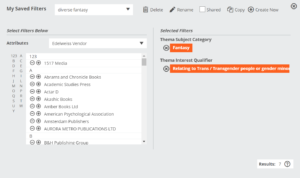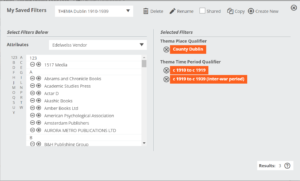
Supporting Diverse Books through the Thema Classification System
This summer, we implemented Thema subject categories for UK publishers, retailers, and other users on our site. This development work was part of a larger project to improve the discoverability of diverse books on our site.
Here is how Thema fits into our commitment to building a more equitable book world and why more publishers should consider adopting the system.
At Edelweiss, we’ve seen that behind every successful book stands good metadata. Accurate and comprehensive information about a title’s contents and themes is key to a book finding and connecting with its audience. It guides title searches and makes it possible for a book to be discovered by a reader who will love it or by the librarian or bookseller who will place it in her hands.
Metadata that is too generic or too basic, however, can do a disservice to a book by failing to capture and communicate its content or potential audiences. Unfortunately, this can be all too common for titles that feature underrepresented voices and perspectives, works that might not fit into the categorization schemas employed by the book industry or which are not categorized properly.
And, the stakes for diverse books are high—a lack of visibility not only frustrates readers seeking literature that reflects their lived experiences but also may unfairly jeopardize the future publication of diverse voices. If a diverse book fails to find its readership and has poor sales, a publisher may mistakenly assume that the audience for similar titles is lacking.
For these reasons, we are excited to partner with the nonprofit organization EDItEUR in support of their global subject classification system, Thema. Thema is relatively new system, but it has already gathered wide international adoption by publishers and is designed to enhance book discoverability. It employs a system of category codes and qualifiers, which combine to achieve a high level of specificity in communicating a book’s content and audience—particularly as it relates to diverse topics and themes.
In this system, publishers categorize books within twenty broad subject sections. Each of these twenty sections sits at the top of a hierarchy of increasingly detailed subject categories several levels deep. Publishers use these subject categories in combination with ‘qualifier’ tags, which allow them to add nuances such as place or time period to a selected category. Qualifiers also designate if the book has major themes or storylines relating to, or of major interest to, specific groups of people.
For example, as EDItEUR outlines, a book of history about Black working-class women in the USA would use the subject codes NHTB (Social and cultural history) and JBSF1 (Gender studies: women and girls) in combination with the qualifiers 5PB-US-C (Relating to African American / Black American people) and 5PDD (Relating to lower socioeconomic groups / status).
 Or, a book in the fantasy genre that features transgender characters could use FM for Fantasy with the qualifier 5PT (Relating to Trans / Transgender people or gender minorities). Similarly, a fiction book set in Dublin during 1910-1910 could use FB for Fiction: General and Literary with the Dublin place qualifier (1DDR-IE-LDD) and time period qualifier for c 1910 to c 1919 (3MPBF).
Or, a book in the fantasy genre that features transgender characters could use FM for Fantasy with the qualifier 5PT (Relating to Trans / Transgender people or gender minorities). Similarly, a fiction book set in Dublin during 1910-1910 could use FB for Fiction: General and Literary with the Dublin place qualifier (1DDR-IE-LDD) and time period qualifier for c 1910 to c 1919 (3MPBF).
We are now displaying these Thema categories and qualifiers on Edelweiss title listings for UK users on our site, so they can quickly see if a book fits their interests or needs. We also have incorporated Thema into our search options, enabling users to generate a list of titles meeting particular categories and qualifiers. Users can filter using multiple Thema criteria in combination with one another, and they can also combine the Thema descriptors with Edelweiss filters for additional data such as publisher, publication date, and more.
 This way, if a booksellers and librarian has identified genres or themes in which they hope to improve their inventory, they can easily generate lists of books that fulfill this brief using Thema filters. Or, if a patron or customer requests a book with specific criteria (for example, a book set or relating to East Anglia), Thema filters on Edelweiss can make swift work of finding such a title.
This way, if a booksellers and librarian has identified genres or themes in which they hope to improve their inventory, they can easily generate lists of books that fulfill this brief using Thema filters. Or, if a patron or customer requests a book with specific criteria (for example, a book set or relating to East Anglia), Thema filters on Edelweiss can make swift work of finding such a title.
We see Thema as a key way to support the visibility and success of diverse titles, to nurture and grow the audience for these books, and to improve the mix of titles available to the public in general. Of course, all this depends upon publishers including accurate and complete Thema metadata for their titles. We hope to roll out Thema visibility for users outside the UK market once more publishers begin sending us this information.
For publishers new to Thema, the full Thema structure can be explored here, with further details about Thema available on EDItEUR’s site. If you are ready to start using Thema to categorize your books, a good place to start would be mapping your backlist from BIC or BISAC to Thema.
And, for publishers new to Edelweiss and our catalog services, more information is available here. Publishers with questions can also reach out to us here.
This post was originally published on the Bookmachine blog and is reproduced with edits here.

